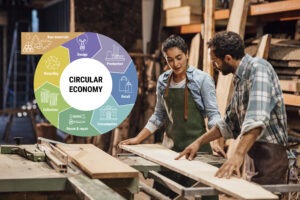Technology Environment & Sustainability
CME NL: Sustainable Innovation for Products (SIP) Program

Overview
The Sustainable Innovation for Products (SIP) Program (TAAD) is a systematic approach to improving products’ social, environmental, and economic performance, driving revenue growth and cost reduction while enhancing the brand.
HOW IT WORKS
The program is delivered in six half-day modules over 8-10 weeks, either virtually via Zoom or a Hybrid combination of Zoom and in-person sessions.
Upon completion of the SIP program, you will:
- Understand global and local issues driving demand for more sustainable products.
- Be familiar with the life cycle thinking and stages of your chosen product line.
- Understand the carbon footprint of a product line and its impact throughout its life cycle. This includes identifying areas where carbon emissions are highest and calculating the company’s direct carbon emissions. By doing so, opportunities for reducing carbon emissions throughout the life cycle can be identified.
- Be able to explain the idea of Net Zero Carbon Targets and share how the company is aligned with this goal, including the steps being taken to reduce carbon emissions on the path to achieving Net Zero.
- Be familiar with the concept of a Circular Economy; know how to measure and identify actions to improve the waste present in each product line.
- Be able to discuss the social and economic effects of a product throughout its life cycle and determine ways to enhance the social and economic impacts of a specific product line.
- Learn about Sustainable Procurement and utilize a proven process to integrate Sustainability into procurement practices. This will enable Sustainability to be incorporated into purchasing decisions and throughout the Supply Chain.
- Discover the secrets of Sustainable/Green Marketing. Craft engaging marketing messages highlighting your products’ sustainability benefits and learning about available Sustainability Certifications for your products.
Eligibility
CME Members operating in Newfoundland and Labrador who are current participants in the Manufacturing Productivity Program.
Focus/Topic
Module 1: Building the Foundation
- Life Cycle Thinking
- The Business Case
- Regulatory Pressures
Module 2: Carbon Impacts
- What is Carbon Accounting?
- Carbon Pricing
- Understanding & Aligning to Net Zero
- Carbon Footprint Hotspots
- Carbon Footprint Calculation
- Carbon Reduction Opportunities
Module 3: Circular Economy Impacts
- What is the Circular Economy?
- EPR & Stewardship Fees
- Circularity Impacts on Product Lifecycle
- Measuring Circularity
- Opportunities to Improve Circularity
Module 4: Social & Economic Impacts
- Understanding Social Impacts
- Understanding Economic Impacts
- Opportunities for Reducing Social Impacts
Module 5: Sustainable Procurement
- What is Sustainable Procurement
- Leveraging Procurement to Drive Sustainability
- A Proven Process
Module 6: Sustainable Marketing
- Best Practices of Sustainable Marketing
- Crafting the Right Sustainability Messaging
- Sustainable Product Certifications & Protocols
- Identify Certifications/Protocols
Who can benefit
Small and medium-sized businesses in Newfoundland and Labrador who want to improve their product sustainability
